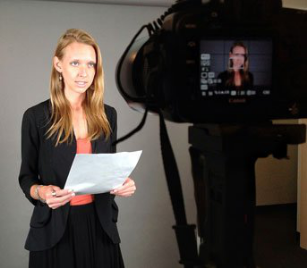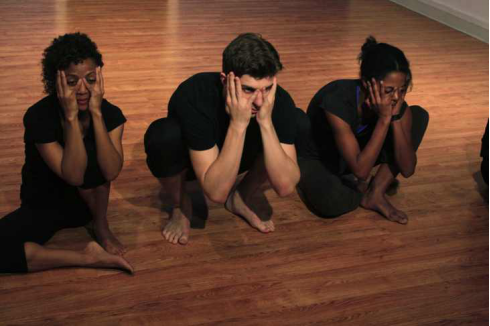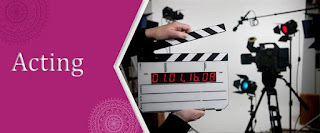Beverly Hills, California Shahzaad Ausman expressing that acting is acting, yet everything you do for stage, you must do just the contrary for film. On stage you can pretend something happens, but in front of the camera you should experience it happening. Instead of expressing outwardly for stage, you need to internalize for film and let your eyes and voice do the speaking. A long way on screen in terms of adding believability and realism.
1. Voice and Diction
One distinction between acting in front of an audience and on camera has to do with distance. On camera, more often than not, your scene partner is there with you, within at least a couple feet, so you simply converse with them like nobody's listening.
Stage performers have only one opportunity to hit the nail on the head so it is vital to have a solid voice and know their lines. Small theaters and low budget productions may not utilize microphones so a solid voice and extraordinary diction are fundamental. Keep it low and practical, conversational for the camera. On screen, characters have many chances to get a scene right. They can do several takes.
2. Body Language
Contingent upon the size of the theater, the performers need to exaggerate their actions and facial expressions so that the people seated in the furthest most seats in the back can hear and see what is happening on stage. Performing artists can't express sorrow with only tears in their eyes because only those in the front row will see it. On the other hand, when acting for the camera, the actor must take care not to use grand body language as they would on stage because in a close-up or even medium shot, that would look as though they were attempting to get someone's attention over a bustling bar on a Saturday night.
It would read as comedic to the audience rather than dramatic. It would simply be too much. The key for both is basing your actions on the size of frame you are in. In a traditional theatre, the proscenium is considered the frame. In film, it is literally whatever is seen on camera at the time of shooting. A brilliant actor knowns to perform differently on a small stage or in the round than they would an arena or stadium. The bigger the playing space, the bigger the actions.
3. Preparations
Performances happen in real time. Stage actors spend numerous practice hours building up their characters' identities and peculiarities, and spend much more hours remembering their lines. Regardless of this readiness, stage performers should be quick-witted and able to think on the spot, on the off chance that something unexpected happens.
People forget their lines, miss their cues, lose props, set pieces fall apart, lighting cues are missed and sound malfunctions. Things always happen in live theatre. Actors must think quick to cover these malfunctions, seemingly as if they didn't happen at all. Stage performers always benefit by taking classes in improvisation. Improv will train you to think and act fast when these unforeseen mishaps take place during a live performance.
4. Direction
Theatre directors direct actors. They spend many hours during many nights over the course of many weeks working with their actors. In most cases, it is the director who casts the actors for a stage production so they are familiar with what the actors are capable of and what they bring to the table and they work closely with them to build on that. Directors teach the actors their blocking. They break down the scenes and develop the characters with them, explaining what they should be feeling or doing in each scene to convey to the audience precisely what needs to be understood.
Film directors direct the scene, not the actors. In many cases, casting agents cast the actors and the director meets them at a table read or on set the day of the shoot. The directors trust that the actors are professional and do not need coaching. Film shoots are pressed for time. Time is money. A location is rented for a set amount of hours on a particular day and a director has to get as much filming done as possible within that set amount of time.
5. Eye-Lines and Other Characters
The actor interacts with other characters. They are face-to-face in the scene and play off of each other directly or indirectly. Even if the scene involves a telephone call, the voice of the other actor may be heard or the other actor may even be seen somewhere else on stage. Either way, the actors receive their stimulation and energy from their scene partner on the spot. They create magic together in real time, right before the audience's eyes.
6. Sequence
When the actor plays for the stage, he starts at the beginning of the story and ends at the end. They live throughout the entire life of the character during that particular story. Everything usually happens in a linear order. Rehearsals might take place in a random order, with the most difficult scenes being rehearsed first in order to allow more time to perfect them; but, overall, the production itself takes place from beginning to end.
7. Chemistry
Stage actors spend many weeks with each other going through the scenes and the story-lines, a natural chemistry develops between them. They get to know each other on stage and off. They have time to work together on building character relationships and back stories. They get to work through the scenes together and figure out what works and what needs to be changed in order to give the best performance overall. Stage actors have time to build a kinship that reads to the audience that these people have a history together. The audience will believe it because it is real.
8. Audience Feedback
Stage actors are lucky in that they get instant feedback from their audience from the moment they walk on stage. They can hear, see, and feel the energy coming from the house and get an idea of what the audience is thinking and feeling during the whole process. If they hear laughter, they know they are doing a good job. If they hear scoffing or crying, they know their emotional scenes are on point. If they hear nothing, that silence tells them they need to turn things up a notch and increase their own energy in order to project that into the house. Stage actors have about two hours each night to work on getting the audience's approval.












